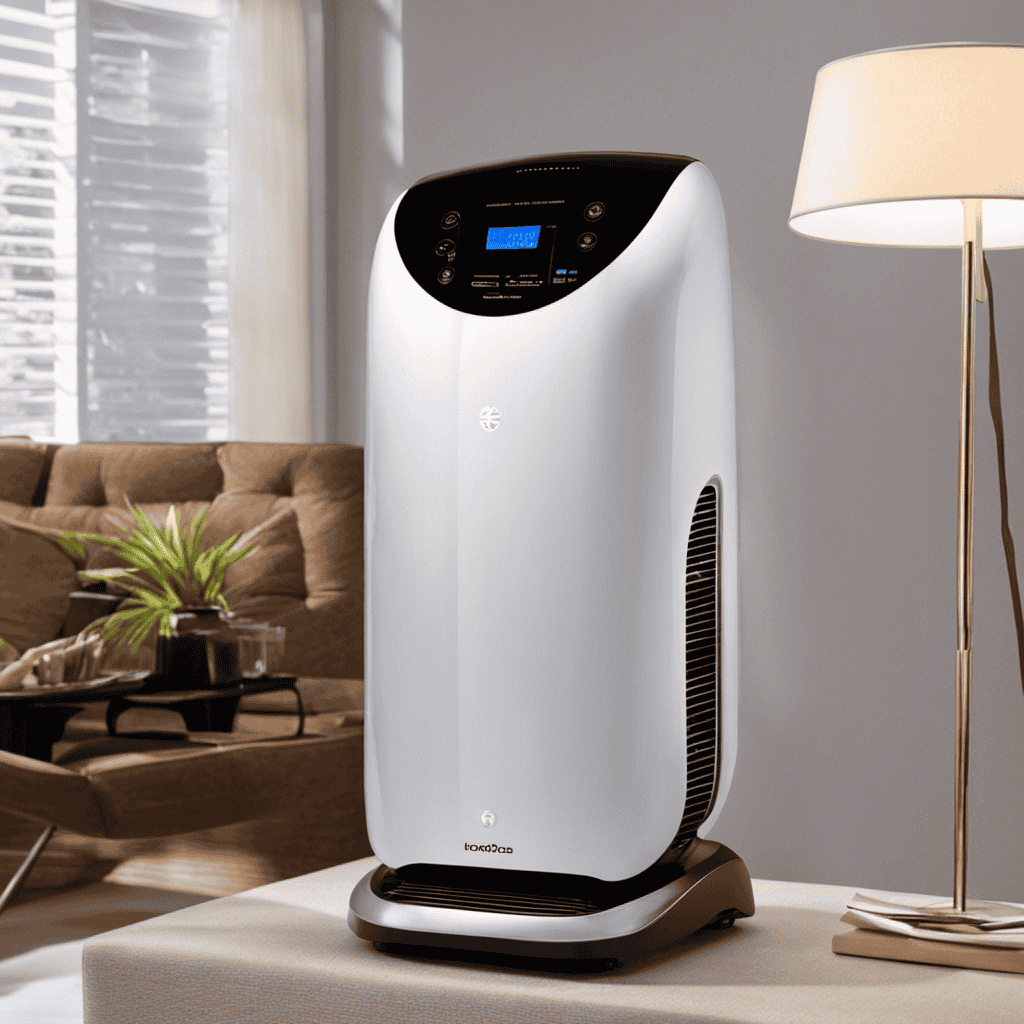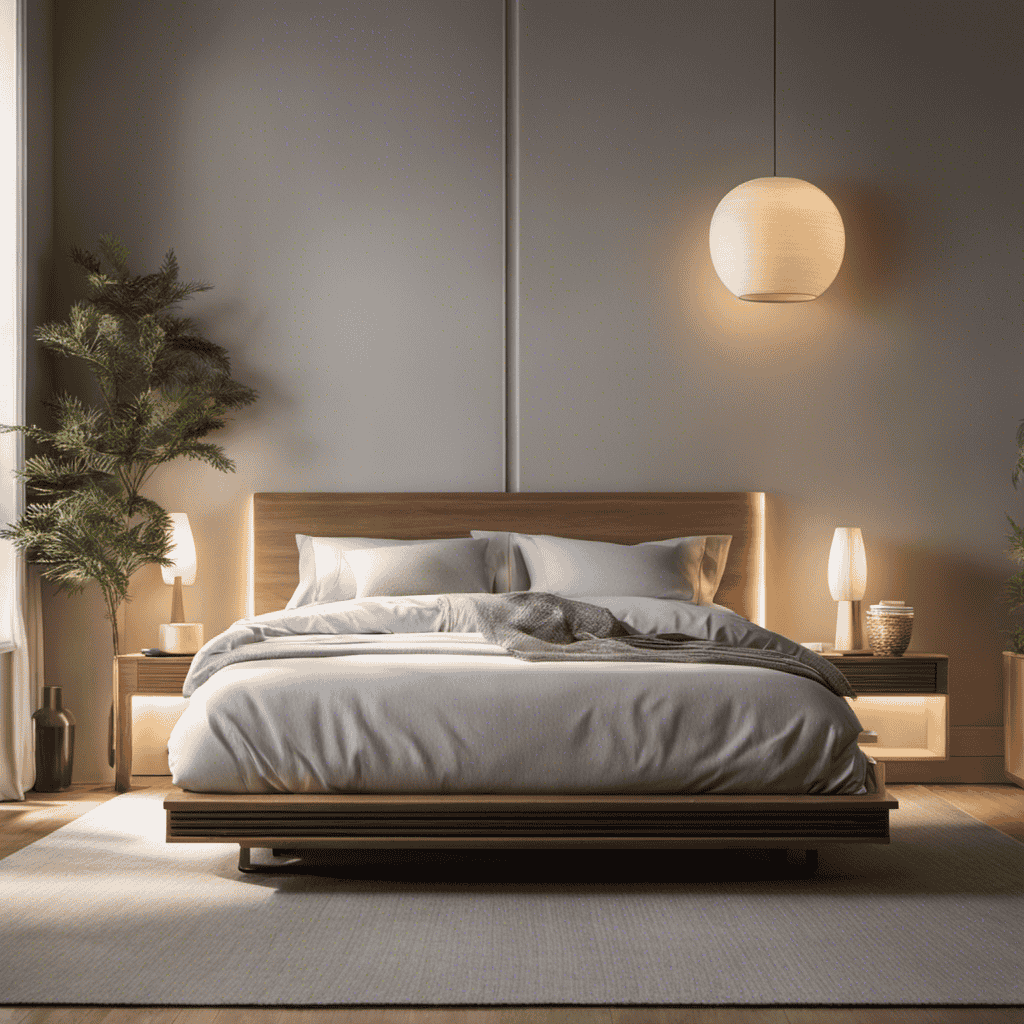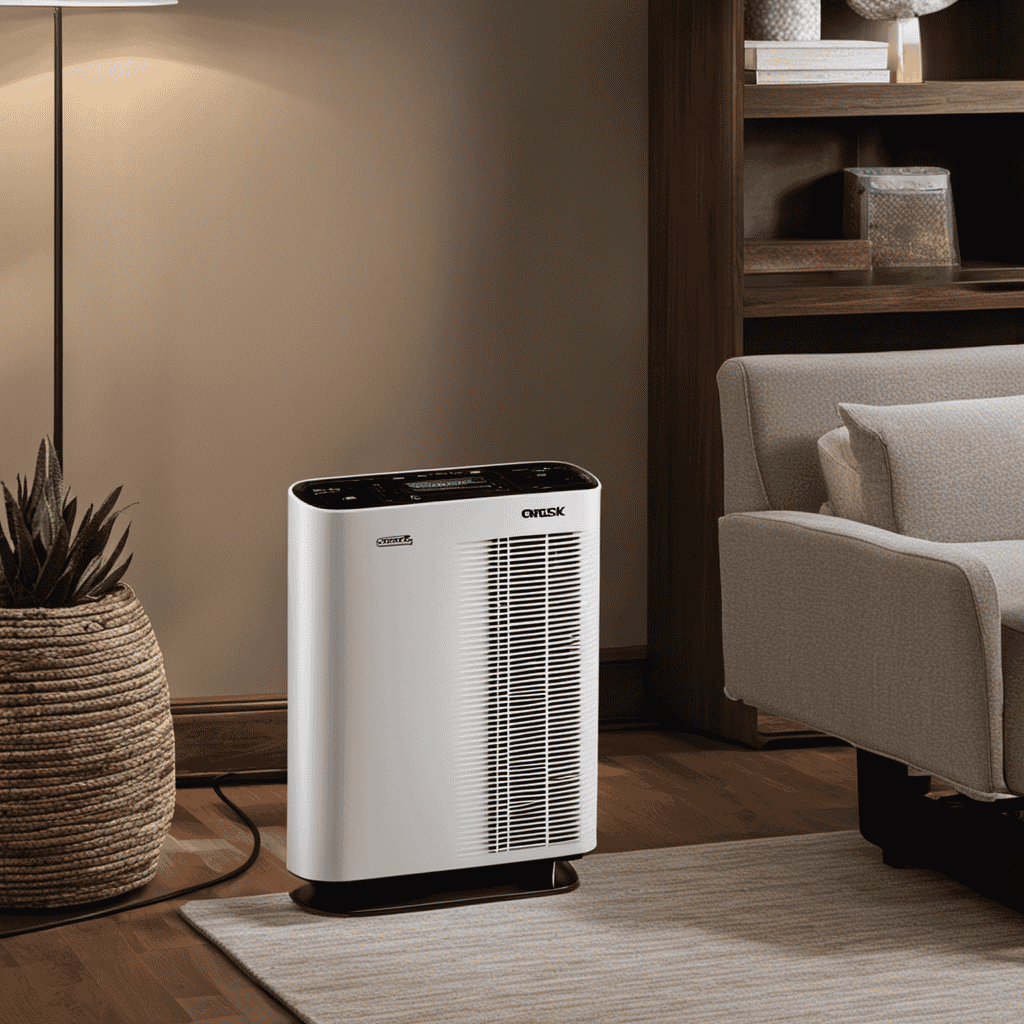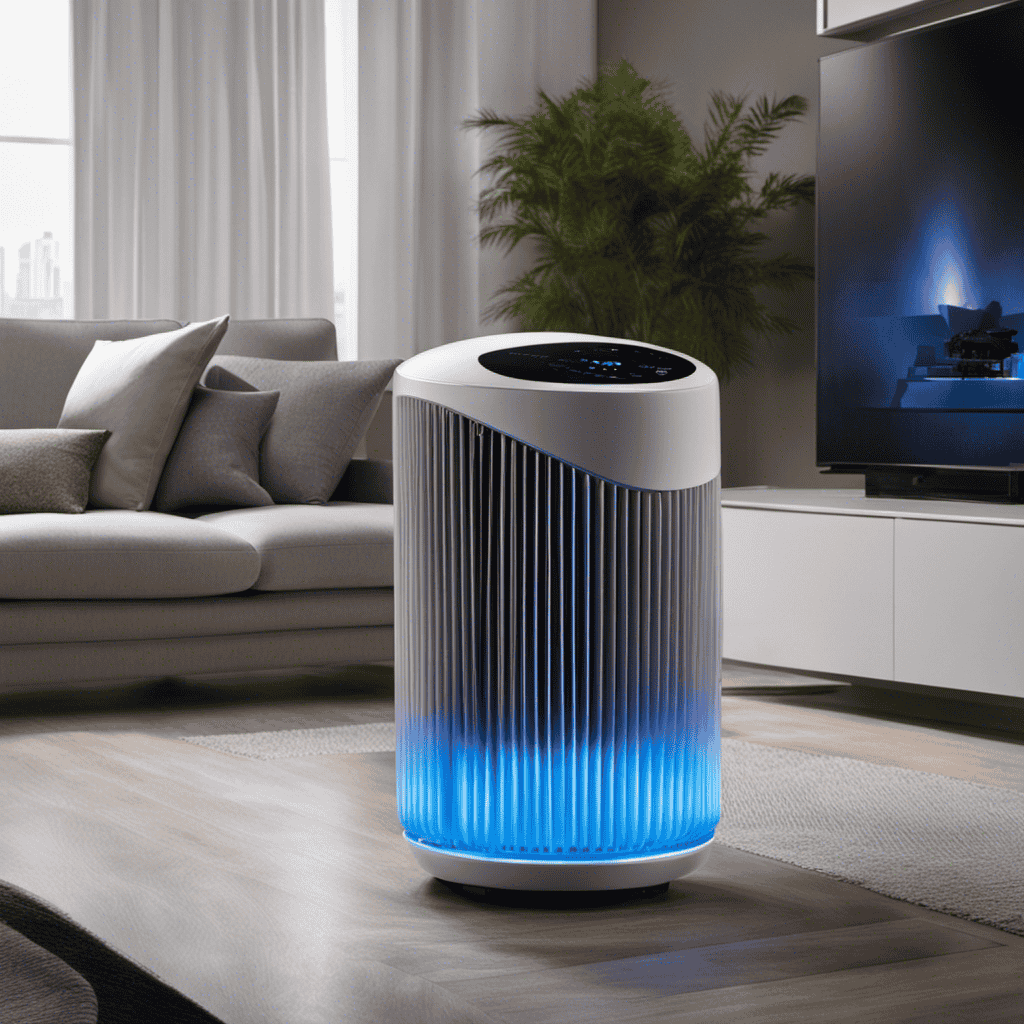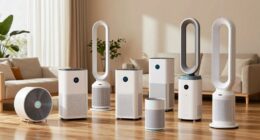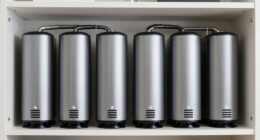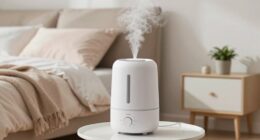When I enter a room, I can’t help but be aware of the fresh, clean air that envelops me. The air purifier with an ionizer quietly hums in the corner, effortlessly doing its job.
But what exactly does an ionizer do? In this article, we will delve into the fascinating world of ionization and discover how it plays a crucial role in purifying the air we breathe.
So, join me on this scientific journey as we unravel the mysteries of ionizers and their impact on air purification.
Key Takeaways
- An ionizer releases negatively charged ions into the air.
- These ions attach to harmful particles such as dust, allergens, and bacteria.
- The attached ions make the particles heavy, causing them to fall to the ground or stick to surfaces.
- Using an ionizer in an air purifier can remove allergens and pollutants, improve indoor air quality, reduce respiratory symptoms, and decrease asthma triggers.
How Does an Ionizer Work in an Air Purifier
You might be wondering how an ionizer works in an air purifier. Well, let me explain the fascinating ionizer technology.
An ionizer is a device that releases negatively charged ions into the air. These ions attach themselves to harmful particles, such as dust, allergens, and bacteria, making them heavy and causing them to fall to the ground or stick to surfaces. This process is known as ionization.
The ionizer in an air purifier helps to remove these pollutants from the air, improving indoor air quality. In addition to reducing airborne particles, ionizers also have other benefits. They can neutralize odors, such as smoke or pet smells, and they can help to alleviate symptoms of allergies and asthma.
Benefits of Using an Ionizer in Your Air Purifier
When it comes to improving indoor air quality, one of the key benefits of using an ionizer in your air purifier is its ability to remove allergens and pollutants.
An ionizer works by releasing negatively charged ions into the air, which attach themselves to airborne particles such as dust, pollen, and pet dander.
These charged particles then become too heavy to remain airborne and are effectively removed from the air, leading to cleaner and healthier indoor air.
Improved Indoor Air Quality
Using an ionizer on an air purifier can help improve indoor air quality. The ionizer releases negatively charged ions into the air, which attach to airborne particles, causing them to become heavy and fall to the ground. This process effectively removes pollutants and allergens from the air, providing numerous benefits for your health and well-being.
Here are five key ways in which an ionizer can improve indoor air quality:
-
Reduction of respiratory symptoms: By removing airborne particles and allergens, an ionizer can help alleviate symptoms such as coughing, sneezing, and wheezing.
-
Improved sleep quality: Cleaner air means fewer irritants in your respiratory system, leading to better sleep and reduced snoring.
-
Decreased asthma triggers: Asthma sufferers often experience relief when using an ionizer, as it helps remove common triggers like dust mites, pollen, and pet dander.
-
Odor elimination: Ionizers can neutralize unpleasant odors, leaving your indoor environment smelling fresh and clean.
-
Enhanced overall well-being: Breathing cleaner air can boost your immune system, increase energy levels, and improve overall health and mood.
Allergen and Pollutant Removal
An ionizer helps eliminate allergens and pollutants from indoor spaces by releasing negatively charged ions that attach to airborne particles, causing them to become heavy and fall to the ground. This process, known as ionization, plays a crucial role in improving indoor air quality and reducing respiratory symptoms.
By neutralizing harmful substances in the air, ionizers effectively reduce the presence of allergens such as dust mites, pollen, and pet dander. These particles, which are often responsible for triggering allergies and respiratory issues, are captured and removed from the air.
Furthermore, ionizers can also target pollutants like smoke, chemical fumes, and volatile organic compounds (VOCs). These substances, commonly found in household products and industrial environments, can have detrimental effects on our health. Ionizers work by attaching negatively charged ions to these particles, causing them to clump together and fall to the ground, where they can be easily cleaned and removed.
Understanding the Role of Ions in Air Purification
When it comes to air purification, one key component that often gets overlooked is the ionizer.
An ionizer is responsible for releasing negatively charged ions into the air, which attach themselves to airborne particles and cause them to become heavier and fall to the ground.
This process not only helps to remove pollutants and allergens from the air, but it can also have a positive impact on our health by reducing the amount of harmful substances we breathe in.
Ionizer’s Air Purification
To enhance the air purification process, you’ll want to know how an ionizer works on your air purifier.
An ionizer is a device that uses ionization technology to improve the quality of the air you breathe.
Here are five key points to help you understand the role of an ionizer in air purification:
-
Ionization process: An ionizer emits negatively charged ions into the air, which attach to positively charged particles such as dust, pollen, and pet dander.
-
Ion attraction: The negatively charged particles are attracted to positively charged surfaces, such as walls or furniture, and are removed from the air.
-
Reduction of airborne particles: By removing these particles, an ionizer helps reduce allergens and pollutants in the air, improving indoor air quality.
-
Ionizer vs. HEPA filter: While both technologies are effective in air purification, an ionizer can target smaller particles that may escape a HEPA filter.
-
Ozone production: It’s important to note that some ionizers may produce ozone, a potential lung irritant, so it’s crucial to choose an ionizer with low ozone emissions.
Understanding how an ionizer works can help you make an informed decision when choosing the right air purifier for your needs.
Benefits of Ionization
If you’re looking to improve the quality of the air you breathe, understanding the benefits of ionization can help you make an informed decision. Ionization is a process in which air molecules are charged with negative or positive ions, which can have numerous positive effects on the air quality in your home or office. One of the key benefits of ionization is its ability to remove harmful particles and allergens from the air. By charging these particles, they become attracted to surfaces and are subsequently removed from the air you breathe. In addition, ionization can also help to neutralize unpleasant odors by breaking down the molecules that cause them. This can lead to a fresher and more pleasant-smelling environment. Furthermore, ionizers can also help to improve overall air circulation, ensuring that the ionized air is distributed evenly throughout the space. Overall, the effectiveness of an ionizer in improving air quality is well-documented, making it a valuable addition to any air purification system.
| Ionization Benefits | Ionizer Effectiveness |
|---|---|
| Removes harmful particles and allergens from the air | Well-documented improvement in air quality |
| Neutralizes unpleasant odors | Even distribution of ionized air |
| Improves overall air circulation | |
Ionizer’s Impact on Health
In my previous discussion on the benefits of ionization, I highlighted how ionizers can help purify the air by removing harmful particles and allergens. Now, let’s delve into the impact of ionizers on our health.
Ionizers have a significant effect on both mental and respiratory health. Here are some key points to consider:
-
Mental Health:
-
Ionizers generate negative ions, which can improve mood and overall well-being.
-
Negative ions help reduce stress, anxiety, and depression.
-
Increased serotonin levels due to negative ions promote relaxation and better sleep.
-
Respiratory Health:
-
Ionizers can effectively remove airborne pollutants, such as pollen, pet dander, and mold spores.
-
Negative ions attach to positively charged particles, making them heavier and easier to be trapped by filters.
The Science Behind Ionization in Air Purifiers
You might be wondering how ionization works in air purifiers. Understanding the ionization process is crucial in grasping the impact of ionizers on respiratory health.
Ionization is the process of adding or removing electrons from atoms or molecules, resulting in the creation of charged particles called ions.
In air purifiers, ionizers emit negative ions into the air, which attach to airborne particles, such as dust, pollen, and pet dander. This causes the particles to become negatively charged and, as a result, they are attracted to positively charged surfaces, such as walls or filters.
Common Misconceptions About Ionizers in Air Purifiers
Now that we understand the science behind ionization in air purifiers, let’s address some common misconceptions about ionizers. There are several myths surrounding these devices that may lead to misunderstandings about their effectiveness.
Myth 1: Ionizers produce harmful ozone levels.
Myth 2: Ionizers only mask odors, rather than eliminating them.
Myth 3: Ionizers remove beneficial ions from the air.
Myth 4: Ionizers are noisy and disruptive.
Myth 5: Ionizers require constant maintenance and expensive filter replacements.
It’s important to dispel these misconceptions to gain a clearer understanding of how ionizers work and their potential benefits. By addressing these myths, we can make informed decisions about whether to incorporate ionizers into our air purification systems.
Comparing Ionizers to Other Air Purification Technologies
When comparing ionizers to other air purification technologies, it’s important to consider their effectiveness and long-term cost.
An ionizer, also known as an ion generator, uses a process called ionization to remove pollutants from the air. It works by releasing negatively charged ions into the air, which attach to positively charged particles such as dust, pollen, and mold spores, causing them to become heavy and fall to the ground. This can be an effective method of air purification, especially for larger particles.
However, when compared to other technologies like filters or UV C light, ionizers may have limitations. Filters, such as HEPA filters, can capture a wider range of particles, including smaller ones, and can be more effective in removing allergens and pollutants from the air.
UV C light, on the other hand, can kill bacteria and viruses by damaging their DNA.
It’s important to weigh the pros and cons of each technology and consider your specific needs when choosing an air purification method.
Is an Ionizer Necessary in Your Air Purifier
When it comes to the effectiveness of ionizers in air purification, there is a lot of debate within the scientific community.
Some studies suggest that ionizers can effectively remove certain airborne particles, such as dust and allergens.
However, there are also concerns about potential health risks associated with ionizers, particularly the production of ozone and negative ions.
In this discussion, I will explore the current research on the air purification effectiveness of ionizers and the potential health risks that they may pose.
Ionizer’s Air Purification Effectiveness
To improve the effectiveness of your air purifier, you can consider using an ionizer. An ionizer helps to neutralize airborne contaminants and can have a significant impact on allergies and respiratory health.
Here are five reasons why an ionizer can be beneficial:
-
Reduction of allergens: Ionizers release negatively charged ions that attach to allergens like dust, pollen, and pet dander. This makes them heavier and causes them to fall to the ground.
-
Elimination of odors: The ions produced by an ionizer can break down odor-causing molecules, effectively eliminating unpleasant smells.
-
Improved air quality: Ionizers neutralize pollutants like bacteria, viruses, and mold spores. This helps to create cleaner and healthier air to breathe.
-
Enhanced respiratory function: Breathing in cleaner air can reduce respiratory irritation and improve lung function. This is especially beneficial for individuals with asthma or allergies.
-
Increased overall well-being: With fewer airborne contaminants, ionizers contribute to a healthier indoor environment. This leads to improved overall health and well-being.
Using an ionizer in your air purifier provides numerous benefits for both allergy sufferers and those concerned about respiratory health. However, it is essential to consider potential health risks associated with ionizers.
Potential Health Risks?
In terms of the risks associated with long-term ionizer use, it is important to consider the potential side effects that may arise.
While ionizers are generally considered safe for use, there are a few concerns that need to be addressed. One of the main risks is the creation of ozone, a harmful gas that can irritate the respiratory system and exacerbate existing respiratory conditions such as asthma.
Additionally, some studies have suggested that ionizers may produce negative ions, which can react with certain airborne substances and create harmful byproducts. These byproducts may include formaldehyde and other volatile organic compounds, which can have detrimental effects on human health.
Therefore, it is crucial to use ionizers in moderation and ensure proper ventilation to minimize any potential health risks.
Moving forward, let’s explore the potential health effects of using an ionizer in an air purifier.
Potential Health Effects of Using an Ionizer in an Air Purifier
You should be aware of the potential health effects of using an ionizer in your air purifier. While an ionizer can effectively remove airborne particles, it also releases charged ions into the air, which may have long-term effects on your respiratory health.
Here are some key points to consider:
-
Increased ozone levels: Ionizers can produce ozone as a byproduct, which can irritate the lungs and worsen respiratory conditions.
-
Negative ions and allergens: While negative ions can attach to allergens and make them heavier, causing them to fall to the ground, they can also trigger asthma and allergy symptoms in some individuals.
-
Lung tissue damage: Prolonged exposure to ionizers may lead to inflammation and damage to lung tissues, potentially causing respiratory issues.
-
Chemical reactions: Ionizers can interact with other substances in the air, leading to the production of harmful byproducts such as formaldehyde and other volatile organic compounds.
-
Sensitivity and side effects: Some people may be more sensitive to ionizers, experiencing headaches, dizziness, or throat irritation.
It is important to weigh the benefits against the potential risks when considering the use of an ionizer in your air purifier, especially if you have pre-existing respiratory conditions.
Tips for Maximizing the Effectiveness of an Ionizer in Your Air Purifier
When it comes to maximizing the effectiveness of an ionizer in your air purifier, there are several key points to consider.
First and foremost, proper placement and positioning of the air purifier is crucial. Placing it in a central location in the room will ensure that the ionizer can effectively distribute ions throughout the space.
Additionally, regular cleaning and maintenance of the air purifier, including the ionizer, is essential to keep it functioning at its best. This includes cleaning the ionizer plates or wires regularly to remove any buildup or debris that may hinder its performance.
Lastly, it is important to follow all safety precautions when using an ionizer in your air purifier. This includes ensuring that the ionizer is properly grounded, as well as avoiding direct contact with the ionizer wires or plates to prevent any potential electrical hazards.
Placement and Positioning
To maximize effectiveness, it’s important to consider the placement and positioning of an air purifier ionizer. Proper positioning ensures that the ionizer can effectively distribute ions throughout the room, improving air quality.
Here are some key factors to consider for optimal placement and positioning:
- Distance: Place the air purifier ionizer at a central location in the room to allow for maximum coverage.
- Height: Position the ionizer at a height of about 3 to 6 feet from the ground to ensure an even distribution of ions.
- Direction: Direct the ionizer towards the center of the room to allow for better circulation.
- Obstructions: Avoid placing the ionizer near objects that may obstruct the airflow, such as curtains or furniture.
- Room size: Consider the size of the room and choose an ionizer with appropriate coverage to effectively purify the air.
By considering these factors, you can ensure that your air purifier ionizer is optimally placed and positioned for maximum effectiveness.
Now let’s move on to the next section about cleaning and maintenance.
Cleaning and Maintenance
Regular cleaning and maintenance are essential for keeping your air purifier ionizer operating at its best and ensuring long-term effectiveness.
The first step is to check and clean the air purifier filters regularly. These filters play a crucial role in trapping airborne particles, such as dust, pollen, and pet dander. Over time, these filters can become clogged with debris, reducing their efficiency. To clean them, simply remove the filters and gently vacuum or wash them, following the manufacturer’s instructions.
Another important aspect of maintenance is troubleshooting common issues. If you notice a decrease in the ionizer’s performance, it may be due to a dirty ionizer plate. Clean it carefully using a soft cloth or brush.
Additionally, regularly inspect the power cord and plug for any damage.
Ionizer Safety Precautions
Make sure you follow these safety precautions to ensure the proper operation and longevity of your ionizer.
- Keep the ionizer away from water sources to prevent electrical hazards.
- Avoid placing the ionizer near flammable materials to prevent fire risks.
- Clean the ionizer regularly to remove dirt and debris that can affect its performance.
- Use a soft cloth or brush to gently wipe the ionizer’s exterior and remove any dust accumulation.
- Follow the manufacturer’s instructions for proper maintenance and filter replacement.
When it comes to ionizer safety guidelines, it is crucial to prioritize the well-being of both yourself and your ionizer. By following these precautions, you can ensure the efficient functioning of your ionizer and extend its lifespan.
Remember to exercise caution and consult the user manual for any specific safety recommendations.
How to Clean and Maintain the Ionizer in Your Air Purifier
When cleaning and maintaining the ionizer in your air purifier, it’s important to follow the manufacturer’s instructions for best results. Maximizing ionizer performance starts with regular cleaning to remove any buildup of dust or particles that may hinder its effectiveness.
To clean the ionizer, first, make sure the air purifier is turned off and unplugged. Then, carefully remove the ionizer according to the manufacturer’s instructions. Use a soft brush or cloth to gently wipe away any dirt or debris from the ionizer plates. Avoid using water or harsh chemicals, as they may damage the ionizer.
If you encounter any issues with the ionizer, such as reduced performance or strange noises, refer to the troubleshooting section in the user manual or contact the manufacturer for assistance.
Now, let’s explore the controversial topic of whether ionizers generate ozone.
Do Ionizers Generate Ozone? Exploring the Ozone Controversy
To determine if ozone is generated by ionizers, it is important to be aware of the ongoing controversy surrounding this issue. Many people have concerns about the potential health effects of ozone and whether or not ionizers contribute to its production. Here are five important points to consider:
-
Ozone generation controversy: There is an ongoing debate among experts about whether ionizers generate significant amounts of ozone.
-
Ionizer technology: Ionizers work by releasing negatively charged ions into the air, which attach to airborne particles and remove them from the air.
-
Ozone production: Some ionizers do produce small amounts of ozone as a byproduct of the ionization process.
-
Health concerns: High levels of ozone can be harmful to human health, irritating the respiratory system and worsening existing respiratory conditions.
-
Regulation and standards: Different countries have different regulations governing ozone emissions from ionizers, with some setting strict limits to ensure consumer safety.
It is important to carefully consider the potential health risks associated with ozone generation when deciding whether to use an ionizer in your air purifier.
Choosing the Right Air Purifier With an Ionizer for Your Needs
Choosing the right air purifier with an ionizer for your needs can greatly improve the quality of the air you breathe.
Air purifiers with ionizer technology have become popular due to their ability to effectively remove pollutants from the air. An ionizer releases negatively charged ions into the air, which attach to positively charged particles such as dust, pollen, and pet dander. This process causes the particles to become heavy and fall to the ground, making it easier for the air purifier to capture them.
Furthermore, ionizers can also neutralize certain odors and kill some airborne bacteria and viruses. However, it is important to note that not all ionizers are created equal. Some air purifiers with ionizers may produce ozone, which can be harmful to your health.
When choosing an air purifier with an ionizer, make sure to look for one that is ozone-free and has additional air purifier features to effectively remove specific pollutants from the air.
Can an Ionizer Remove Specific Pollutants From the Air
If you’re concerned about specific pollutants in the air, consider an ionizer that has additional features to effectively remove them. An ionizer can be a valuable tool in improving the air quality in your home or office. Here are five reasons why an ionizer can be effective in removing specific contaminants:
- Ionizers release negatively charged ions into the air, which attach to positively charged particles like dust, pollen, and pet dander, causing them to fall out of the air and onto surfaces.
- Some ionizers also utilize a HEPA filter, which can capture smaller particles like smoke, mold spores, and bacteria.
- Ionizers can neutralize odors by breaking down volatile organic compounds (VOCs) that are responsible for unpleasant smells.
- They can help reduce the presence of allergens in the air, providing relief for individuals with allergies or asthma.
- Ionizers also have the ability to remove airborne viruses and bacteria, improving overall air quality and reducing the risk of respiratory infections.
By incorporating an ionizer into your air purifier, you can effectively target and remove specific pollutants from the air, leading to cleaner and healthier indoor environments.
Now, let’s discuss if there are any downsides to using an ionizer in your air purifier.
Are There Any Downsides to Using an Ionizer in Your Air Purifier
In my research, I have found that while ionizers can be effective at removing certain pollutants from the air, there are potential health risks associated with their use. One of the main concerns is the production of ozone, a harmful gas that can irritate the respiratory system and worsen existing respiratory conditions.
It is important to note that not all ionizers produce high levels of ozone, but it is still a factor to consider when using an air purifier with an ionizer.
To maximize the effectiveness of an ionizer without compromising your health, there are a few tips to keep in mind. Firstly, it is important to choose an air purifier with a low ozone emission level. Look for models that are certified by reputable organizations such as the California Air Resources Board.
Additionally, it is recommended to use the ionizer feature sparingly and only in well-ventilated areas. Regularly cleaning and maintaining the unit is also crucial to ensure optimal performance.
Frequently Asked Questions About Ionizers in Air Purifiers
To get the most out of your ionizer, remember to clean and maintain it regularly for optimal performance. Ionizers are commonly found in different air purifier models and play a crucial role in improving indoor air quality.
Here are some frequently asked questions about ionizers in air purifiers:
- How does an ionizer work?
- What are the benefits of using an ionizer?
- Do ionizers produce ozone?
- Can ionizers remove odors?
- How does an ionizer impact energy consumption?
An ionizer works by releasing negatively charged ions into the air, which attach to airborne particles and make them heavier, causing them to settle out of the air. This process helps to reduce airborne pollutants and improve air quality.
While ionizers can effectively remove odors and some particles, they can also produce a small amount of ozone as a byproduct. It is important to choose an ionizer that meets safety standards to avoid excessive ozone production.
Additionally, ionizers typically have a low energy consumption, making them an energy-efficient choice for air purification.
Frequently Asked Questions
How Long Does an Ionizer Typically Last in an Air Purifier Before Needing to Be Replaced?
An ionizer in an air purifier typically lasts for several years before needing to be replaced. However, it is important to clean the ionizer properly and follow best practices for maintenance to ensure its longevity.
Can an Ionizer Effectively Remove Cigarette Smoke and Other Strong Odors From the Air?
An ionizer in an air purifier can effectively remove cigarette smoke and strong odors from the air. It can also eliminate cooking odors and kitchen fumes, as well as pet dander and pollen, making the air cleaner and healthier to breathe.
Are Ionizers Safe to Use Around Children and Pets?
Ionizers on air purifiers improve indoor air quality by removing harmful particles. However, it is important to consider safety around children and pets, as ionizers can produce ozone, which can be harmful in high concentrations.
Can an Ionizer Help Alleviate Symptoms of Allergies and Asthma?
An ionizer can help alleviate symptoms of allergies and asthma by releasing negatively charged ions into the air. These ions attach to allergens and pollutants, causing them to become heavy and fall out of the air, reducing the risk of inhaling them. However, it’s important to note that ionizers may also have side effects such as the production of ozone, which can be harmful in high concentrations.
Do Ionizers Consume a Lot of Energy Compared to Other Air Purification Technologies?
Ionizers on air purifiers have varying energy consumption levels, depending on the model. However, it is important to note that the effectiveness of ionizers in purifying the air is not solely determined by energy consumption.
Conclusion
In conclusion, the ionizer is a valuable component of an air purifier. It enhances the ability of the air purifier to remove pollutants from the air. By releasing negatively charged ions, the ionizer attracts and neutralizes harmful particles. These particles include dust, allergens, and smoke. This process is known as ionization. It improves the overall air quality and creates a healthier environment. So, if you’re looking for an effective air purifier, make sure to choose one with an ionizer. This will allow you to experience the benefits of this advanced technology. Remember, cleaner air means a healthier life.
